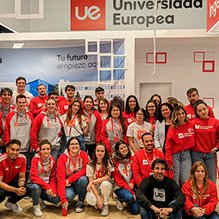-10% Discount on place reservation for 25/26 intake until July 31st!
The Master’s in Architecture at Universidad Europea is a 9-month programme designed to equip you with the knowledge and skills to succeed as a global architect and manage all sorts of projects including construction, urban planning, sustainability and advanced project design. The Master in Architecture is defined by three pillars - Innovation, Internationally, and Integration.
With a focus predominantly on experiential learning, having learned the theory from our esteemed faculty, you will have the opportunity to put what to have learned into practice through work placements and real life projects. In recognition for its international focus, the programme has been awarded the NAAB certification (Substantial Equivalency USA) and RIBA validation (Royal Institute of British Architects) facilitating you to practice architecture in the USA, Great Britain and across the Commonwealth, respectively.
Official degree issued by Universidad Europea de Madrid
| Campus-based | Villaviciosa de Odón | 10 months, 60 ECTS | Start: 8 sep. 2025 | School of Architecture, Engineering, Science and Computing - STEAM |
A glimpse into your future at Universidad Europea
1
Validated by the Royal Institute of British Architects (RIBA) and certified by the National Architectural Accrediting Board (NAAB).
100%
Real case studies of prestigious architecture studios.
4
According to El Mundo’s rankings, it is one of the best universities for Architecture.
Offered in the current academic course
At the end of this programme, students will receive the official title of Master in Architecture issued by Universidad Europea de Madrid.
PRIMER CURSO
| Materia | ECTS | Tipo | Idioma de impartición |
|---|---|---|---|
| M1 TECHNOLOGY PROJECT WORKSHOP | 8 | OBLIGATORY | Bilingual |
| PROJECT WORKSHOPS M1 | 12 | OBLIGATORY | Bilingual |
| FINAL PROJECT | 30 | OBLIGATORY | Bilingual |
| DIGITAL URBAN PLANNING | 4 | OPTIONAL COURSE | Bilingual |
| BIOCLIMATIC AND BIOMIMETIC ARCHITECTURE | 6 | OPTIONAL COURSE | Bilingual |
30 places available
If you want to take your work experience to the next level before finishing your university education, you can pursue an extra-curricular internship. You are allowed to choose any area of study; however, we remind you that the internship is an educational addition to your studies. Therefore, the more knowledge you have acquired throughout your studies, the more you will benefit from the internship experience.
Upon completion of the Master’s Degree, students will be prepared to carry out the following roles within the field of Architecture:
Start your future at Universidad Europea
You can become a student at Universidad Europea in three easy steps.
1
Start your admission process by calling +34 917407272 or request information and our advisors will contact you.
2
Once you have been admitted, secure your place by paying the reservation fee.
3
Submit the required documents to formalise your enrollment.
Scholarships and financial aid
We want to help you. If you want to study at the Universidad Europea, you will have at your disposal a wide selection of own and official scholarships.
Credit recognition and transfers
You don’t have to stick with something you don’t like. That’s why we’ve designed specific plans for credit recognition and transfers.
Request your online credit recognition review, transfer your academic file and start studying at Universidad Europea.

Get to know the facilities and discover why Universidad Europea is made for you.
50% of professors are doctors.
The Master in Architecture at Universidad Europea in Madrid is 9 months long and consists of 60 ECTS. The aim of the programme is to equip you with the skills necessary to lead architecture projects around the world, and be familiar with the latest tools and technology used in the sector. The programme, therefore, includes modules such as digital urban planning, industrialised construction, and bioclimatic architecture.
Our master in architecture at Universidad Europea has been awarded the NAAB certification (Substantial Equivalency USA) and RIBA validation (Royal Institute of British Architects) facilitating you to practice architecture in the USA, Great Britain and across the Commonwealth. Such certifications open doors to greater career prospects. It is also ranked as one the best schools of architecture, according to El Mundo’s rankings.
In addition, over the course of the programme, you can take part in international visits to some of the leading architecture firms, learning from and making contacts with the very best in the industry.
This Msc in architecture opens doors to a variety of careers in the sector. Many of our graduates from this programme go on to achieve success in areas such as:
The master in architecture at Universidad Europea is a challenging programme designed to ensure you have the skills and knowledge to reach the very top of the architecture field. Throughout the programme you will have the support of a top faculty, made up of experts and professionals from leading architecture studios and organisations.